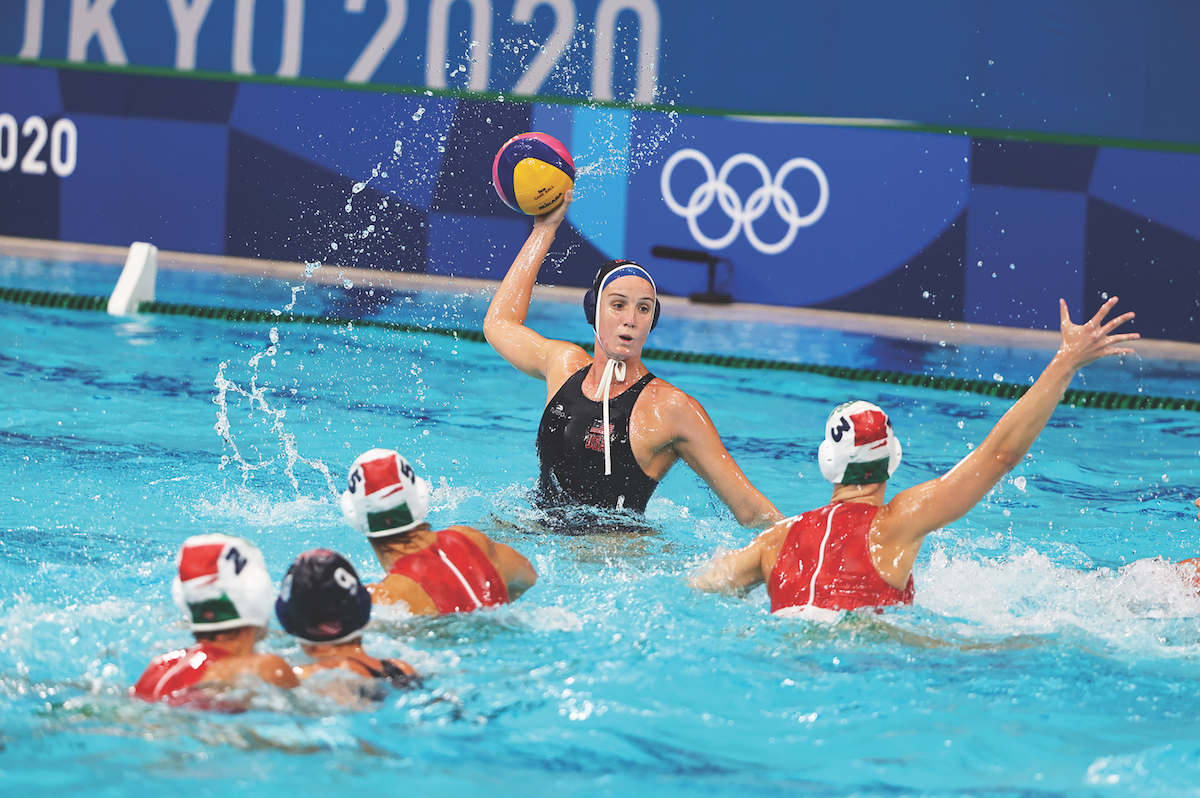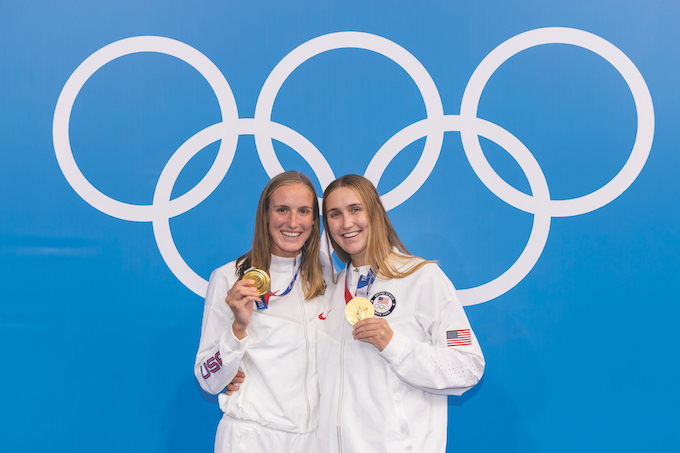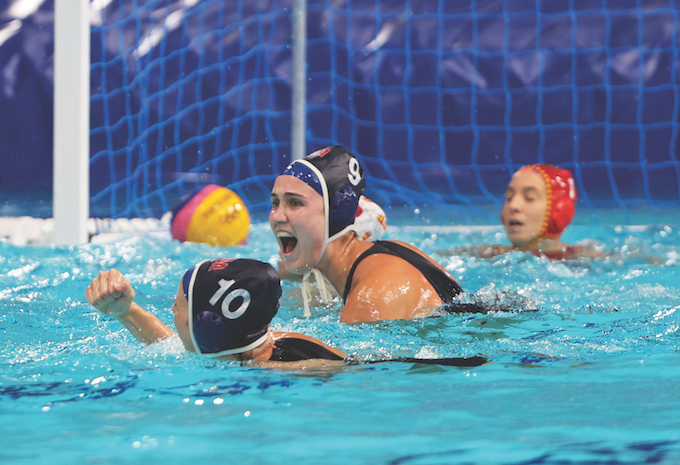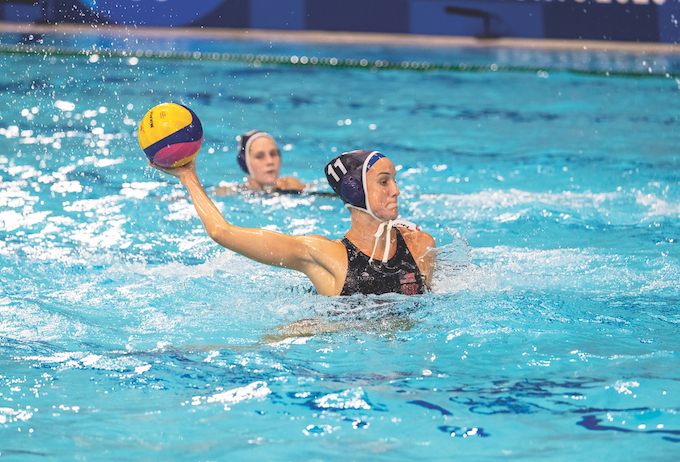
Laguna sisters Makenzie and Aria Fischer helped the U.S. women’s water polo team to a win at the Tokyo Olympics.
By Sharon Stello
Sisters Makenzie and Aria Fischer have had their Olympic dreams realized not once but twice in the sport of water polo. And they did it together as both play on the U.S. women’s team, which snagged gold in Rio de Janeiro in 2016 and then again in Tokyo in 2021.
The Fischers, who are originally from Laguna Beach and now attending Stanford University—Makenzie is a senior majoring in mechanical engineering and Aria is a junior studying English—experienced the ups and downs of the 2020 Olympics, which were put on hold during the pandemic and then rescheduled to take place this past summer. That meant they had to train full time for a second year.
The Tokyo Games looked much different than most, with strict mask requirements, COVID-19 testing and no family or members of the public in the audience, but it was still memorable for the athletes who competed.
Here, the sisters describe their experience leading up to the Olympics—quarantining in a Long Beach apartment (near the Los Alamitos training center) where they were living when the pandemic hit—and at the games in Tokyo.
What was it like to represent your country, playing the sport that you love at this level for a second time?
Makenzie Fischer: I was really young the first time I went. And after that Olympics, I really felt like I could have a bigger role on the team. … [It] was really fun for me to see my growth between the [two] Olympics and just being able to feel like I played a huge part in the team’s wins and successes is really great.
Aria Fischer: I think playing water polo at the Olympics is a really special experience because, obviously, it’s the pinnacle of water polo—that’s the biggest tournament. … [Going a second time,] you have a different team, a different group of girls that you’re going with. … [And] it was almost like you had given two full-time years to this Olympic Games and sacrificed and really didn’t do anything for two years other than play water polo. So, in a certain sense, it felt like I had invested more in Tokyo. … It kind of felt like more was at stake.
With the pandemic, how was this Olympic Games different from Rio?
MF: Going into it, I was expecting it to be wildly different and maybe not nearly as special, but I thought Tokyo did a great job putting it on. In the [Olympic] Village, it felt fairly normal: everything you were doing before, just with masks. And we take the competition very seriously anyway, so the whole two weeks we were there, in Rio, I kind of spent the whole time in my room, too, so it didn’t really feel that different for me. …
[Without an audience,] we kind of joked about how we were our own cheerleaders, but that was very much the truth. It was special in its own way, just to have the people that were there day in and day out be the only ones there.
AF: I think not having my friends and family there was … probably the biggest difference. I think when you’re at an Olympic Games, you’re really there to win and to focus, so it’s not like you’re doing a bunch of exploring anyway. … In Rio, we went to the pool and we went to the Village and back and forth. … The same thing happened in Tokyo. It’s not like an opportunity to dine out and go do things. So it was pretty similar other than the mask wearing and [COVID] test taking.
Were you scared to travel to another country during a pandemic or did you feel satisfied with the safety measures they had in place?
MF: I was happy because we had done a training trip … to Spain and Greece a month and a half before so I kind of got the plane jitters out on that trip. … And I was totally comfortable with all the safety measures that were in place in Tokyo. … We got tested every morning and I felt super good about that. But I think we were all a little bit paranoid and anxious about, what if something happens. … There’s just all these things that you would never normally think about at an athletic competition that were at the back of our minds.
In 2020, how did you feel when they made the call that the Olympics was going to be postponed after all your hard work up to that point?
AF: It was definitely disappointing, although, of course, it was the right decision to make. It was scary not knowing if there was going to be an Olympics in 2021 or not.
MF: I think that we were kind of naive—as I think everyone was at the beginning of the pandemic—thinking that, when it first happened, we’ll just quarantine for two weeks and we’ll be back and it’s still going to happen this summer. And I think, when it did get postponed, it hit a lot of us pretty hard. … Best-case scenario, we’re doing another year of full-time training, kind of starting from square zero. Worst-case scenario, we’re going to do another year of full-time training and they’re going to postpone or cancel it [again].

What was your normal training like leading up to 2020 and then how did quarantine affect it?
AF: [During quarantine,] we didn’t get in a pool for two and a half months because they were all closed. Previous to that, the longest amount of time I had spent away from the pool was two weeks, so that was an adjustment, for sure. … I was working out and I had a virtual internship [during that time].
MF: Our normal schedule … is basically Monday through Saturday, we will train 7-10:30 a.m. and 1:30-4:30 p.m.—except Wednesdays and Saturdays, it’s like a four-hour, 7-11 a.m. practice … and then Sunday’s our only off day, so it’s a lot of time. It’s like a full-time job. …
[When] the pandemic shut everything down and we were in quarantine, our weights coach sent us a lot of home workouts, but it was more like, “Do what you need to do,” … especially once the postponement happened, because people were in all different places mentally. … I reenrolled at Stanford and took online classes because there was nothing else to do. …
And then, I think we got cleared to come back in early June … and we were just doing … swimming and skill work, which is not the most fun part about water polo. … Then coming back in September, … there were only certain days we did contact practice and it was based on when we got our testing back. … [In January 2021,] it was back to … doing the normal thing with a lot of testing.
After everything you had been through, when your team won gold, what was it like to stand up there on the podium, receive your medal and hear the national anthem?
AF: It was pretty surreal. We were training for two years straight, full time, and really gave everything we had to be on that podium. So to have everything lead up to that one moment, it was a rush of emotions all at once.
MF: It’s kind of a moment of reflection. You just think back to how much you put in to get to that moment and you know exactly what every girl on the team went through to get there, seeing people struggle and succeed. … And I think it was an even more challenging process this time, full-time training times two—and in a pandemic while you’re at it, not really seeing your friends or family that much. … To kind of see it culminate exactly how we wanted it to go, … it was just really special.
What’s it like playing together with your sister on the same team?
AF: It’s really amazing to have her on the team. We are super close and it’s nice to know someone has my back at all times and truly knows what I’m going through.
MF: We kind of grew up playing water polo together and it’s been cool to see our progress and relationship grow. … And also it’s so nice to have someone you trust completely going through the same things as you, especially when they’re very challenging, just because they know exactly what it feels like—mentally, physically, everything—so you just have this sounding board.

Given that Makenzie is a defender and Aria plays center, what are your playing styles like?
MF: I think that we have a lot of the same values and beliefs and are very similar that way, but I think the way we approach life and water polo can be very opposite. … I’m very composed and don’t show a lot of emotion and [am] pretty calm most of the time. … And Aria’s super passionate—wears her heart on her sleeve. You know exactly what she’s thinking or feeling.
AF: We play opposite positions. Other than that, she typically is a little more composed in the pool and I’m a little more fiery.
Your dad played water polo in the Olympics in 1992 and your mom played on a club team at Stanford. How do you feel about following in their footsteps and continuing that tradition?
AF: I love the fact that water polo is a family sport for us. It’s nice that they know what’s going on when they watch me play because they can give me advice.
MF: It’s nice having my dad almost as a second coach or somebody to bounce ideas off or get feedback from. … And then it’s also really cool to have my mom completely clued in and be so passionate about water polo and love the sport. … But also we definitely have to shut down the water polo conversation sometimes because it’s too much.
What do you like about playing water polo?
MF: I think, initially, I was drawn to the sport for a lot of reasons. I love how it’s a mental and physical game. … You’re always trying to get two or three steps ahead of your opponents [and] it’s super fast-paced. Obviously, it’s incredibly physically demanding, … [but] there’s lots of action and always stuff happening and it’s super dynamic.
AF: I [also] like the fact that it’s a mental and physical sport. You have to combine smarts and toughness. [And] I … like that it’s a team sport. I couldn’t do an individual sport.
Having grown up in Laguna, what do you like most about this coastal city?
AF: I love the community and small-town energy. They were so supportive of Makenzie and I playing water polo and going to the Olympics.
MF: There’s a lot of things to like about Laguna. I love, first of all, the beach. And I think it’s the cutest town in the world with a lot of character. … I think it has the most character out of [all] the beach towns in Orange County, in my opinion.

When you’re in Laguna, is there a favorite restaurant that you have to visit?
AF: I like Starfish. Their green curry is amazing. And I like the vanilla chais at The Koffee Klatch.
MF: I have a lot of favorites. I would say my family’s favorite dinner spot is Royal Hawaiian [Fire Grill] because we love Maro [Molteni]. He’s super awesome. We’re really good friends with him. And then the owner of Wine Gallery, Chris [Olsen]—we love Wine Gallery. We also love Starfish. The food’s so good there. So I would say those are our top three dinner spots. And then I love Active Culture and La Sirena [Grill] … and, recently, Kitchen in the Canyon.
When you aren’t playing water polo, what other kinds of things do you like to do?
AF: I like reading and writing poetry. … I love the emotion and lyrical quality that comes with it.
MF: I love the outdoors and I’m super into camping and backpacking and hiking. Aria and I … [went on a] month-long backpacking trip across the western U.S. states. … That was really fun to kind of get to explore some places in California that I haven’t had the chance to since I’ve been so busy.




